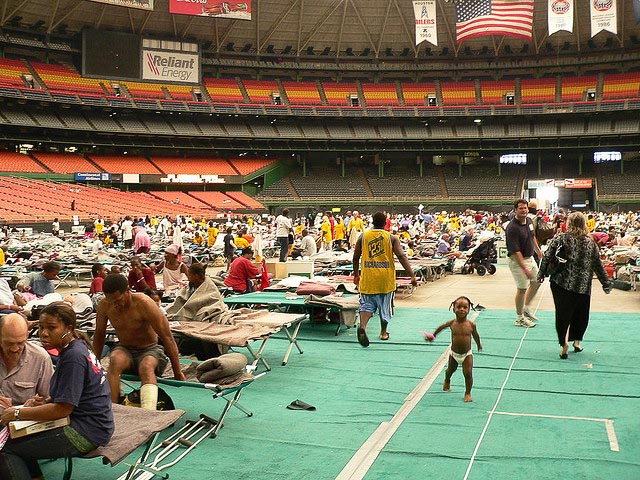Ten years ago Houston gained national attention for opening its doors and hearts to tens of thousands of people who fled New Orleans as Hurricane Katrina ravaged the city.
Images and news coverage of the thousands of refugees, who temporarily called the Astrodome and the George R. Brown Convention Center home, played out in the international media. At the same time, countless others hunkered down with family members or made housing arrangements of their own, settling into new lives in Texas.
As New Orleans sat in chaos, Houston provided much-needed stability, offering what at first seemed like a picture-perfect vision of southern hospitality.
"We're all in this together,” then-Texas Governor Rick Perry said at the time. “They are our neighbors.”
It didn’t take long for those neighborly feelings to wane.
From 2006 to 2010, the Kinder Houston Area Survey, an annual public opinion poll conducted through Rice University, included questions about the influx of Louisiana residents following the 2005 storm. As time passed, Houstonians apparently suffered from a sort of “Katrina fatigue,” and their once-welcoming attitudes towards the new residents diminished.
In 2006, 49 percent of Houston-area residents said the evacuees were a bad thing for the city. A year later, that rate grew to 65 percent, and it increased to just over 70 percent in 2008.
We don’t know where those opinions stand today. We’ve since stopped asking the question about evacuees, but by 2009 and 2010, the feelings appear to have plateaued. At our last check, about 57 percent of residents called the evacuees bad for the city, compared to just 22 percent who believed that they were a good thing.
The honeymoon, it seemed, was officially over.
But what happens when we take a deeper dive into those opinions is revealing.
In 2006, a little more than half the survey respondents said they had interacted with Katrina evacuees. That gives us a great opportunity to see how those interactions may have shaped opinions. A comparison of these two groups – those who interacted with evacuees and those who didn’t – reveals strikingly different sentiments.
The 2006 survey asked Houston residents whether “the overall impact of the Katrina evacuees, who came to Houston last year, has been a good thing or a bad thing for the city?”
Just a third of people who had no interaction with evacuees thought they were good for Houston, with the other two-thirds calling them bad for the city. But among people who had actually come in contact with evacuees, the opinions were more balanced: a 50-50 split.
We saw similar effects, albeit less dramatic ones, when we asked people whether they felt evacuees caused an increase in violent crime. Those who had not interacted with evacuees agreed by a 77 percent to 23 percent margin that the evacuees had, in fact, caused a crime uptick. However, those who were in contact with evacuees were slightly less likely to blame them for the crime wave, agreeing with the premise by a 68 percent to 32 percent margin.
One might surmise that that these findings are due to chance, or perhaps there is a confounding factor. Maybe Houstonians with similar demographics to the evacuees are more likely to interact with them and think they were good for the city. However, upon further statistical analysis, even when controlling for personal attributes like race, age, education, gender and income, there is still a very strong and significant correlation between interaction with evacuees and thinking they had a positive impact on Houston.
Although we cannot explain the exact nature or direction of this correlation, the results are supported by a large body of research about the relationship between contact with outsiders and opinions of them.
Houstonians’ views of Hurricane Katrina were probably shaped by a variety of factors, including anecdotes spread by word-of-mouth, residents’ own personal experiences, and the media. Not all of those perceptions are based on reality, however. For example, criminologists have debunked the narrative spread by police officials that evacuees caused a crime wave.
These findings serve as a caution against the negative framing of media stories. It is highly probable that Houstonians who had no interaction with evacuees were heavily influenced by the onslaught of negative media coverage that linked Louisianans to crime and other problems. Thus, police, lawmakers and the press should exercise caution in releasing statements on vulnerable groups, especially in the absence of compelling evidence.
Finally, this research suggests the power of human connection. Amidst the onslaught of information from news and other outlets that form opinions, we should never underestimate the potential of a simple conversation.
Ethan Raker is a Post-baccalaureate Fellow at the Kinder Institute for Urban Research.

